‘Tyrant’ Series Finale Postmortem: Adam Rayner on Barry’s Full Circle Journey and the Chances of the FX Series Living on Elsewhere
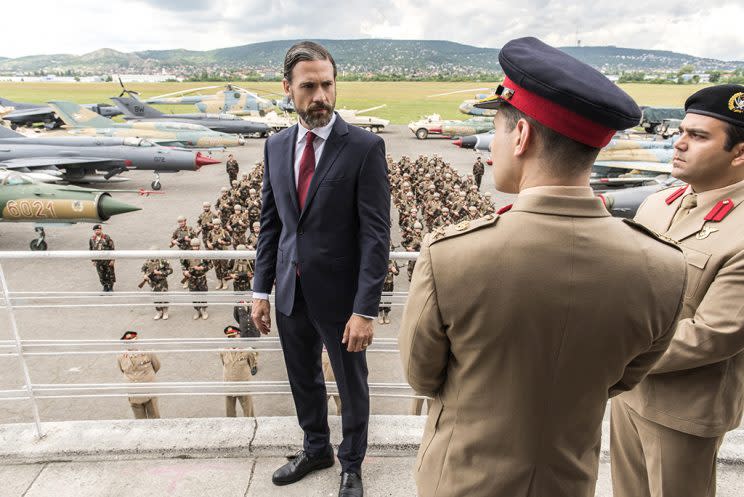
Warning: Storyline and character spoilers ahead for the “Two Graves” series finale episode of Tyrant.
What a difference less than a day makes. When Tyrant star Adam Rayner talked to Yahoo TV on Tuesday evening, tonight’s “Two Graves” installment was a season finale. By Wednesday afternoon, it had become a series finale, at least as far as its run on FX is concerned.
In a follow-up chat on Wednesday, Rayner said the news of the cancellation didn’t come as a total shock, but it is a disappointment. He also supports the idea that the show has plenty of stories left to tell should another network or streaming service consider picking it up.
“Until I was given [an indication] from fairly credible sources, I was hopeful, but it was never going to be a huge surprise, because we know that we were never a huge rating success, and we were never a huge critical success,” Rayner said. “There is a core audience that would definitely watch it, and perhaps a network that didn’t need those immediate figures, overnights, et cetera, might be interested in it. As we discussed [yesterday], it’s more topical than ever, it’s more relevant than ever, it’s a stronger show than ever. I think it would be an asset to any network that picked it up.”
If “Two Graves” does prove to be the series finale, is Rayner satisfied with where the story ends, with Barry essentially becoming the kind of titular leader he set out to be the opposite of, his family fractured, his country disillusioned that he reneged on his promise to allow them to elect their own leader?
“Well, I wouldn’t say satisfied. At least it’s a trilogy, with a beginning, a middle, and an end,” said the actor, who is currently filming an arc on ABC’s new fall legal drama Notorious. “I think you could explore Barry further. I think there are even darker places you could take him… This was where the story had to go, in the episodes available. I think to try and push it further, to an even more total conclusion, would have felt odd, and of course, it was never going to be the case, because everyone always hopes that a show does well enough to come back. I don’t think we would have done anything any differently. I also think there was one eye on it standing as a three [season] trilogy. It had to have an ending that sort of would bring Barry full circle and give a sense of completion, even if there was room to go on.”
Related: Fall TV Preview: The Scoop on 35 New Shows
What follows is our original conversation with Rayner about “Two Graves,” including his thoughts on Barry’s “full circle” evolution, what he found to be the most shocking storyline in a season that included the deaths of several core characters, filming the unsexiest sex scene ever, and what he thinks might have happened next for Barry along his inevitable journey as Abuddin’s leader.
Season 3 really progressed in a way that made the series overall feel like the origin story of Barry’s path to the leadership of the country, specifically, what kind of leader he is and maybe will become.
Yeah, and that was very much how the show was conceived. Obviously it’s a wide-ranging ensemble show, and that’s where its principal strength lies. At the heart of that is this story of a man who thinks his destiny is one thing, and it ends up being another thing. It actually turns out to be something that he fears more than anything else… kind of a dark journey because certainly at the moment it looks like he’s going to become what he’s always despised the most, which is the man that his father and then his [brother] represented. [Barry] has tried very hard to avoid that, but unfortunately the circumstances, and to some extent, his own personality, have contrived to not let him out of that loop that the men in the family seemed to be locked into.
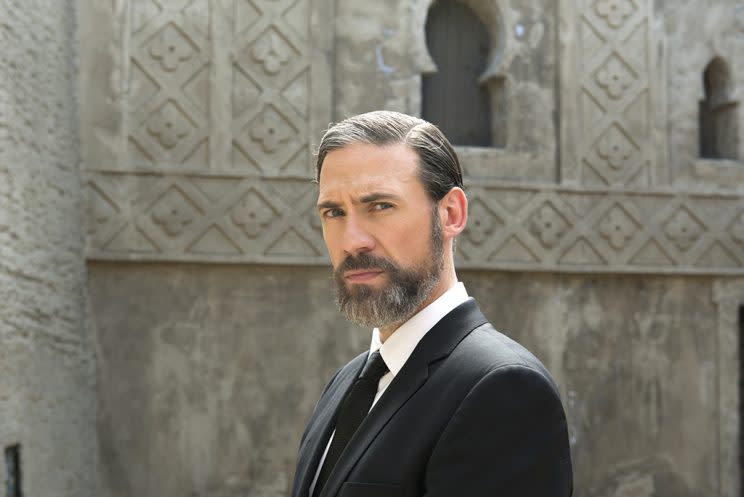
Do you think during all those years Barry stayed away from his home country, living in California, that he felt it was inevitable that if he did return to Abuddin he would end up in this situation?
Well, I think subconsciously that’s one of the reasons why he wouldn’t go back, because he knew, even if he wasn’t acknowledging it, he knew that this place was a pull on him, and he knew that in some sense he couldn’t avoid this need to have an effect on the place, to try to rescue it and to try to rescue his brother and his family from the position that they’d gotten themselves into and taken the country into. He didn’t want to admit that because he wanted to see… he was fooling himself into thinking he could be an ordinary pediatrician in Pasadena. But of course that’s why he wouldn’t go back… he knew deep down, once he was there, he can’t get away from this place, and he can’t help but get involved. There’s no way that he could just come to a wedding and then get on a plane and go home again, certainly not once events transpired as they did. Yes, he was absolutely running away from that even if he didn’t realize.
There were so many times in Season 3 when I thought about that flashback scene, when their father orders young Jamal to kill a man and he can’t, but even younger Barry steps right in and makes the kill.
Everyone always goes back to that moment. It was actually in the pilot. Back at the pilot stage, that was very much the heart of the story. Who is this man, really? What is he running away from? It’s actually within himself. He’s not just running away from circumstances and the country around him, he’s running away from himself, and that’s the bit of himself that he was running away from, someone who will go to that place if he’s provoked, if he’s pushed into it. That’s the sense in which the story has come full circle.
Finally, we’re seeing that kid again, we’re seeing a Barry who… he’s not doing things just for the hell of it. He’s not doing it because he’s evil or a psycho. This is the problem that is faced in the Middle East, when you are dealing with absolutely uncompromising enemies. You are pushed into places that you don’t want to go and you end up becoming what you’re fighting, because they make you [behave] as bad as they are in order to fight them. This is the issue, the problem in a nutshell: How do you defeat evil without it turning you evil yourself? Is it possible not to fight fire with fire? Of course, the circumstances in Abuddin over the last couple of seasons have very much pushed Barry into that place and, unfortunately, bit by bit, he’s gotten closer and closer to returning to being that little kid who takes the gun from Jamal and shoots the guy.
Watch the pilot episode here:
And the violence has impacted Molly (Jennifer Finnigan) in a similar way. The violent murder of their daughter, Emma, makes her become this vengeance-minded, cold person who isn’t the person we first met.
That’s been a wonderful change of trajectory, because in a sense we feel like we’re seeing Barry possibly come back to who he naturally is. With Molly, it doesn’t seem like that. It’s as though there are events that can happen like that which change your DNA in a way and you turn into a different person. It seems that’s what has happened to Molly. It’s not like she is always waiting for some latent effects, but this awful thing happens, and she, in a sense, loses her humanity. I think it’s quite different from Barry. She genuinely becomes a different person whereas Barry comes back to something that was within him all along.
Towards the end of the finale, when Colonel Maloof finally confronts Barry with what his true agenda has been and tells him that he should just accept that he’s never going back to his old life in California, Barry doesn’t resist too much. Do you think he had sort of been waiting for someone to open the door to him making that decision?
What Maloof is saying is, “You know we’re never going to have elections. You’re never going to be that kind of happy, clappy democratic leader that you keep viewing yourself as. You’re going to be a guy who cancels elections. We’re going to have law and order. We’re going to crush the Caliphate, and we’re going to do so by using an absolute ruler whose word is God, and that is the only way we can really get things done under these circumstances.” Barry knows he’s not going back to Pasadena. He’s known that for some time, but what Maloof is saying is, “You know what kind of ruler you’re going to be. Let’s not kid ourselves anymore. You know what you’ve got to do.”
But did he need a nudge from someone to cement that this is the way he’s going to go forward as a leader?
That’s a really good question. In a way, he is fulfilling a destiny, but it is a destiny which circumstances have pushed him into. He’s not fooling himself when he says he wants to be a democratic leader. He really does. In a sense, what he says is that he has the capacity to do the things that may need to be done under these circumstances. It’s not that he was just waiting to become the absolute ruler the whole time and the whole democracy thing was just a kind of cover story… he can do the awful things that may need to be done, and that’s what he fears. Has he been waiting for someone to… yes, I suppose he has been waiting to face the fact that he may have to become a tyrant, basically, and absolutely destroy anyone who is in his way. That moment in the finale, it’s the first time he looks himself in the mirror and sees his father. He realizes that he may have to be that guy. He sees at that point that that may be a conflict, and that he may have to spend his whole life doing things which he’s always tried to avoid, and ruling in a way that, unfortunately, lots of Middle Eastern countries have been and continue to be ruled.
What do you think Barry is feeling when Ahmed presents him with that portrait at the end? He looks horrified maybe, shocked, for a moment, but then there’s this split second of smile, which may be partly because he doesn’t want Ahmed to feel like he did something to upset him.
Yeah, yeah. That is certainly probably what I had in mind when I was playing it, like it’s a sweet gesture by Ahmed. “I know what you’re doing. You’re saying, you are in your rightful place sitting behind that desk.” There’s also possibly a sense of existential irony to it, like Barry sees that it’s kind of a horrible flipped up joke in a way. He just cannot escape that… Barry is alongside his father on the wall, and his brother, there he is. There’s kind of a black humor to that. I guess the final question would be, is there a sliver of him that relishes the power? I think we need to continue with the show to explore that. I think so far, he has been pushed by circumstances. It has always been circumstances that have forced him to do what he does. You could very much argue that he has tried his best to remain human, but his circumstances keep pressing down on him. I think it’s impossible to answer at this stage whether there’s a darkness within him which is not to do with circumstances, but is just a thirst for power or a need to prove himself. I think so far it’s been circumstantial, and we need more to figure out whether there was something even more fundamental at play there.
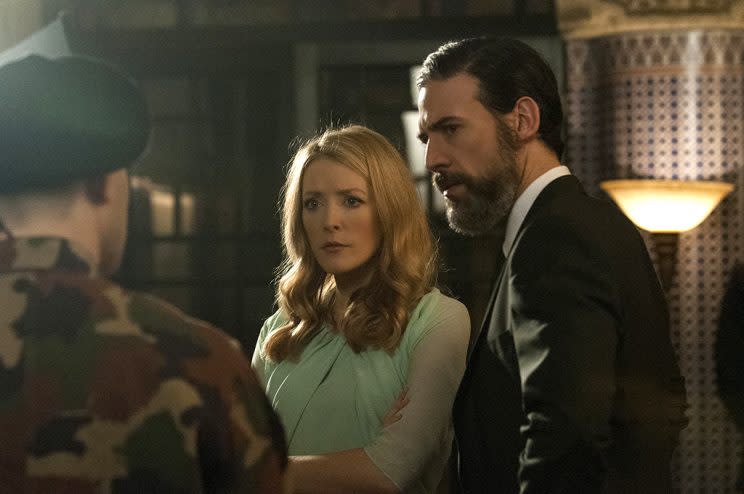
When Molly confronts Barry with her demand that he help her have another child, the resulting sex scene is shocking not because it’s explicit, but because of just how sad it is, and how it’s such a big marker of all the ways the whole family has paid the price for Barry’s new role. That must have been a very different kind of scene to play out.
Yeah, it was very odd. That scene that you never think you’re going to have to… you never imagine you’re going to be playing a kind of reluctant, tragic, almost angry sex scene. Fortunately, Jennifer and I have known each other for some time now and are close friends. We are able to share these intimate moments fairly comfortably and deal with the weirdness of that. It’s certainly not something that you do every day. Scenes of that kind, I think it’s safe to say you probably only do one of those in your career.
There were so many twists, and deaths of major characters this season: Nusrat, Jamal, Emma, Rami, Hussein Al-Qadi. What to you was the most shocking moment or storyline of the season?
I think it has to be the death of Emma. I can’t think of another show where they’ve taken one of the ensemble family who crop up so often in these shows and brutally kill them. I mean, it made me think of The Sopranos, but the one thing they never did was kill the family. That was quite bold and shocking to do that, because there’s a bit of an unwritten rule that you don’t kill the kid, but we did. Terrible things have to happen, but they normally happen to adults. Apart from the structural unexpectedness of it, the fact that we haven’t seen it in TV before, just the idea of it, a husband and wife, a mother and father, watching their child killed in front of their very eyes under those horrifying circumstances. That is the moment of the season. I think everyone worked very hard to make that not come across in a melodramatic way, but as truthfully horrifying as possible.
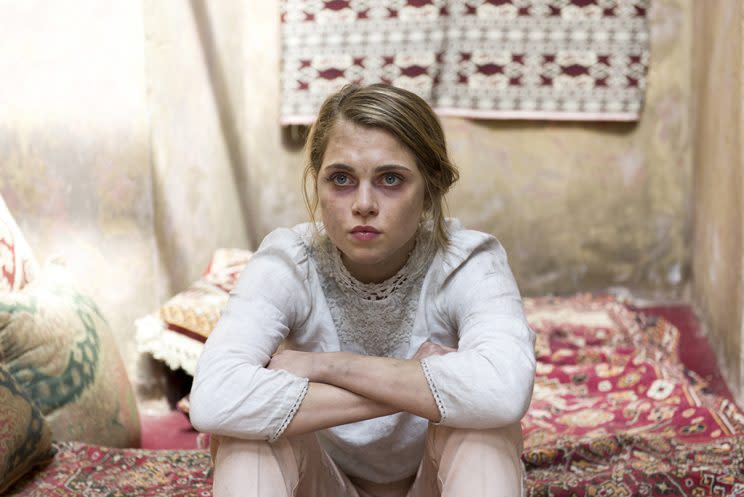
The storyline and the landscape felt a lot bigger this season, but it was easy to be invested in all these different characters, and the ways their stories merged. Did it feel like that while filming it?
Absolutely. I think it was kind of apparent in Season 2 that the show needed to be on a bigger canvas and represent a wider world than just the people coming in and out of the palace… the way the show progressed kind of pointed the way forward as broadening out and making it more of an ensemble piece, trying to represent a broader sweep of characters and conflicts. I think it was one of the strengths of the show to weave all these stories together. I was completely amazed at how they did that. We represented different walks of life, and it also represented both sides, humanizing a group of people who are clearly based on the Islamic state. You get both sides of the story. You also get fully rounded characters from really every section of society and from all points of the argument, from the moderate Islamists, from the old guards, from the students, from the political activists, from the journalists, from the military. I think to represent this world effectively and truthfully you had to have that broader palette of characters, and you had to have those different voices.
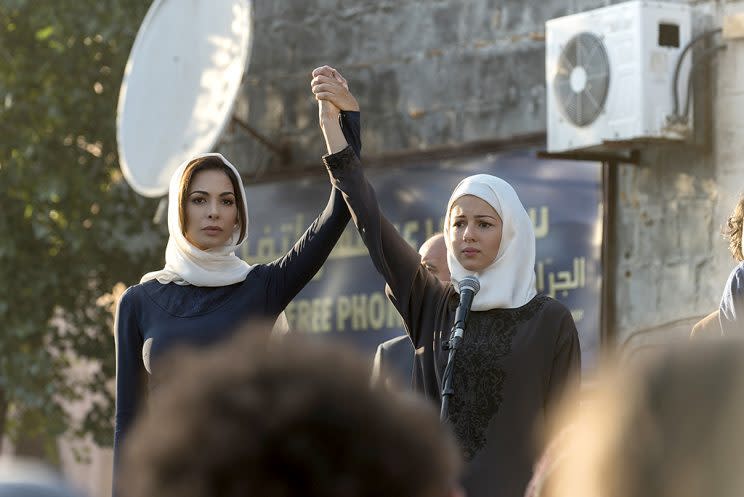
The female characters were represented in a broader way, too, especially in terms of their influence and their political positions and aspirations.
Yes, it was great. We all know that whatever the public face of things are in these countries, women have an enormous influence, because they’re in the homes and these discussions do happen between husband and wife. It was great to see their influence behind the scenes with Nafisa Al-Qadi (Annet Mahendru) and also publicly, the development of Daliyah’s (Melia Kreiling) character. There are female political figures in the Middle East and in conservative countries and I think it is an important responsibility of the show to indicate that if there is progress to be made, then it is by including voices that aren’t heard from at the moment as much as they should be.
I’m assuming that you are hoping for a Season 4, that you are as invested in this character as viewers are.
Absolutely. I think there’s more, as we discussed, there are more stories to be told with Barry. I think we can explore more deeply the specifically psychological elements that aren’t just to do with circumstances around him, that maybe would give us more of an idea of who he really is. Obviously, you’ve got this cast full of characters, and they do drop like flies, but there’s still quite a few of them alive. The main thing is, this show was relevant three years ago, and in a kind of tragic way, it’s even more relevant and immediate now. If you look at the refugee crisis and terrorist attacks in Europe, the ongoing tensions and problems in the Middle East… the issues the show explores are even more relevant and important to us all than they were when we started. It would be a shame not to stick with that.

 Yahoo News
Yahoo News 